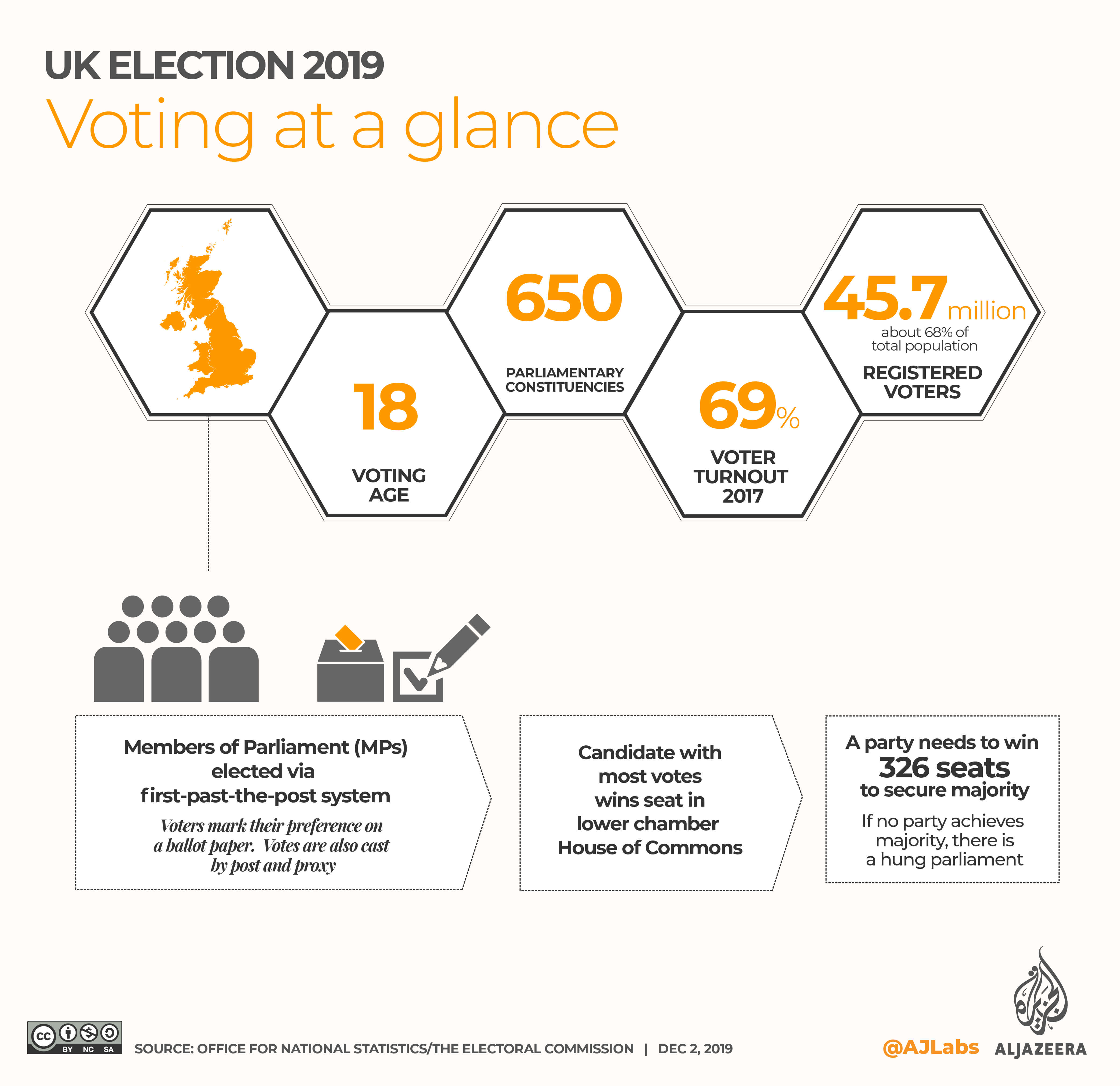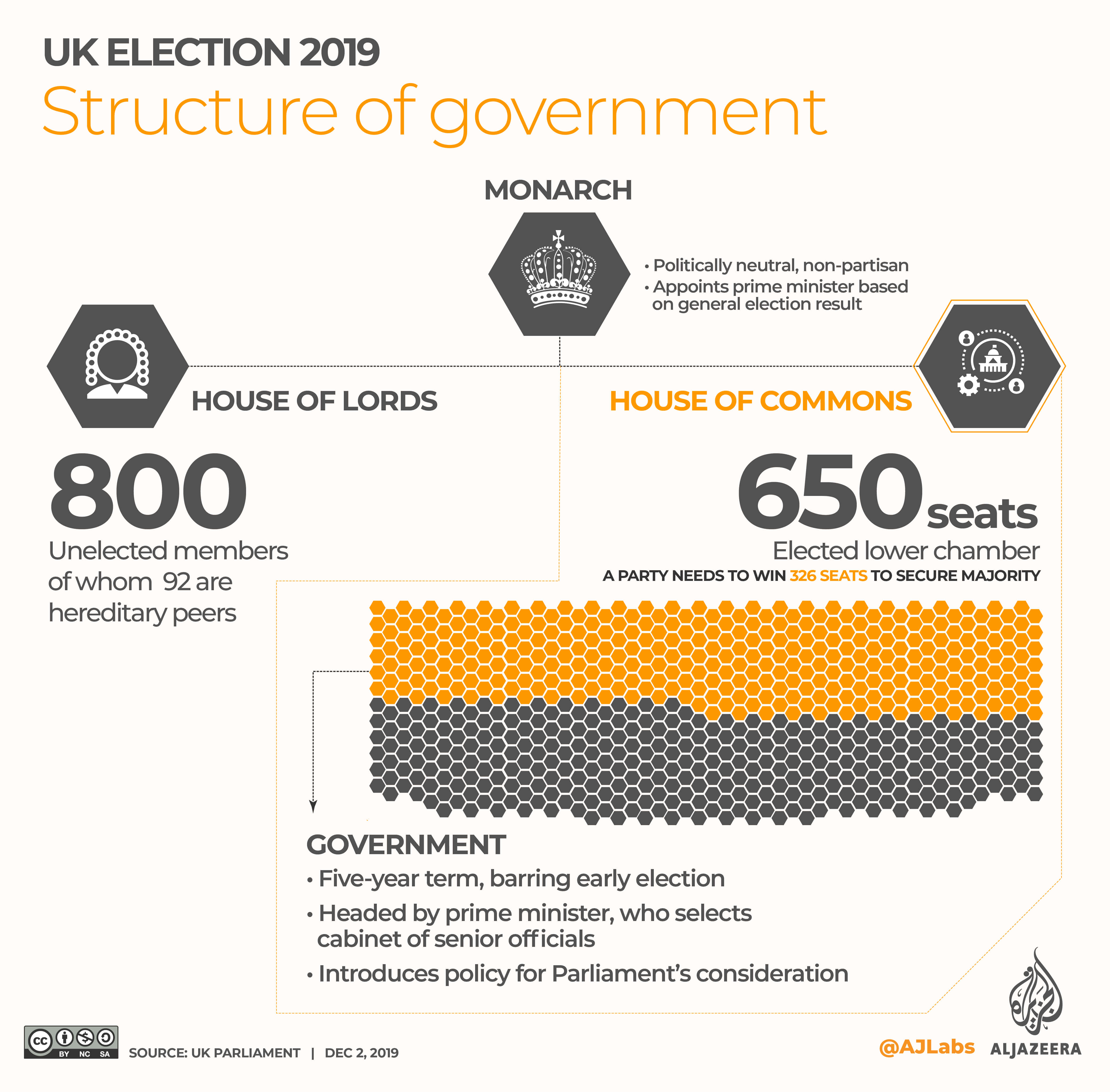
London, United Kingdom – Voting has ended in the United Kingdom‘s snap general election, with the exit poll predicting Prime Minister Boris Johnson’s Conservative Party is on course to win a sizeable parliamentary majority.
Thursday’s high-stakes ballot came after months of political deadlock over Brexit – the UK’s drama-filled bid to quit the European Union.
The exit poll compiled by Ipsos Mori for the BBC, Sky News and ITV suggested the Conservatives were set to secure 368 seats in the 650-member House of Commons, with the main opposition Labour Party on course for 191.
Our Exit Poll Result for BBC/ITV/Sky News predicts a large majority for the Conservatives https://t.co/CubGUCEB69
— Ipsos MORI (@IpsosMORI) December 12, 2019
Such a result would mark the Conservative’s biggest victory since 1987 and hand Johnson the working majority he needs to take the UK out of the EU by the end of next month, as he has repeatedly pledged to do.
It would also signal an historic defeat for Jeremy Corbyn, Johnson’s main challenger and leader of the Labour Party.
Johnson wants to action a swift exit from the EU, while Corbyn is committed to holding a second referendum over the issue.
Among the smaller parties, the Scottish National Party were predicted to win 55 seats, with the pro-EU Liberal Democrats forecast to win 13.
The exit poll has been increasingly accurate in recent elections; correctly predicting the Conservative Party would be the largest party in the UK’s last vote, in 2017.
The final result is not expected to be known until the early hours of Friday morning, however, with constituency vote counts now under way.
More than 45 million voters were registered to take part in the poll, the UK’s third since 2015.
Brexit pledges
Johnson put his “Get Brexit Done” mantra front and centre of the Conservative’s pre-election campaigning efforts, promising to leave the EU by January 31 2020 if he won a majority.
Chris Hopkins, head of political research at research consultancy Savanta ComRes, said the exit poll indicated the prime minister’s pared back campaign messaging had worked.
“If this was the Brexit election and it looks for all intensive purposes, if this exit poll is correct, that it was, then the simple message of ‘Get Brexit Done’ has clearly resonated,” Hopkins said.
“Johnson is going to want to get his Brexit deal through as soon as he can, and it sounds like he is going to have the numbers to do so at a canter really, very, very easily,” he added.
Even if Parliament were to sign off on the prime minister’s withdrawal agreement by the end of next month, a potentially gruelling period of negotiations over the UK and EU’s future relationship would begin as the so-called “transition period” takes effect.
Johnson has repeatedly said this period will not be extended past the end of 2020, when it is currently scheduled to end, but there is widespread doubt over whether a comprehensive agreement could be concluded before then.
“If you really want to get Brexit sorted by the end of December next year then you are looking at a more limited future relationship because you will not have the time to negotiate in more detail a new bespoke arrangement with the EU,” said Maddy Thimont Jack, a specialist Brexit researcher at the UK’s Institute for Government.
“If you look at previous negotiations that the EU has had with other countries then 11 months is much shorter than it took to broker other agreements, for example with Canada, but I do think it is worth saying that in those instances there wasn’t a need for a strict timeframe.”
Corbyn, for his part, pledged that a Labour administration would negotiate a softer withdrawal agreement than the deal brokered between Johnson and Brussels – one aimed at building a new UK-EU customs union and ensuring close alignment to the EU’s single market.
Under Labour’s Brexit plan, the revised deal would be put to a referendum, alongside an option to remain, within six months.
With the party deeply divided over the issue, however, much of Labour’s pre-election messaging focused on the state of public services and its plan for a major shake-up of the economy.







![Ballots are tallied at a counting centre for Britain's general election in Brighton, Britain, December 12, 2019. [Paul Childs/Reuters] Ballots are tallied at a counting centre for Britain's general election in Brighton, Britain, December 12, 2019](http://www.aljazeera.com/mritems/Images/2019/12/12/1d60762105814ed5bfe96d9ee618753c_18.jpg)







